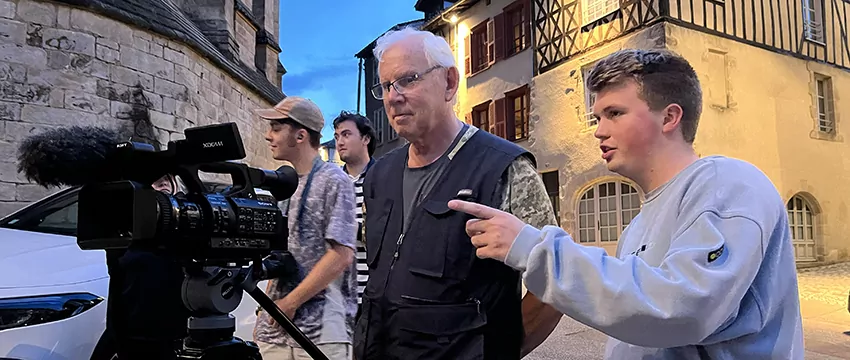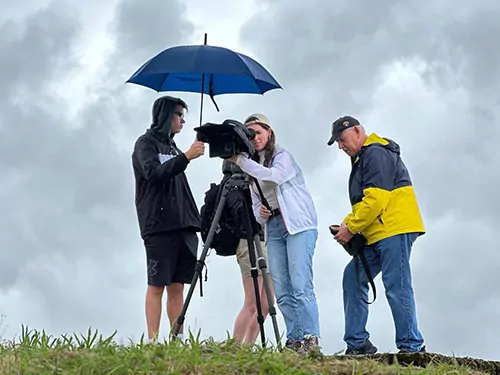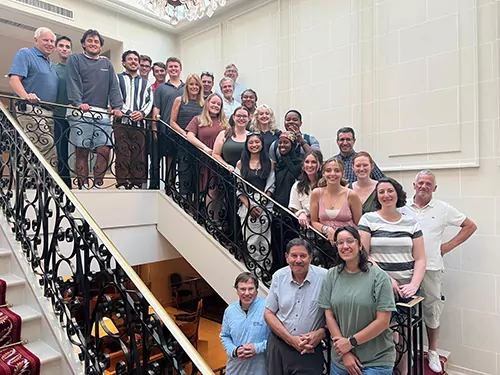Students serve as production assistants on World War II documentary

Students serve as production assistants on World War II documentary
For fourth-year student Xander Chiaramonte, the opportunity to help film interviews with World War II historians on location in France created some incredible summer memories.
“I think the benefit of seeing other areas of the world is something that you just can’t even put into any metric…it’s just the most important thing for perspective,” Chiaramonte said. “And, to be able to do that and learn about what I already love doing was the ultimate package deal for me.”
Chiaramonte was one of five UGA students who spent ten days in France and Switzerland working on a documentary based on the book, “Scholars of Mayhem,” by Daniel Guiet and Timothy Smith. The book is a true story about Guiet’s father who was recruited by one of the Allies’ top spy and Resistance units. The crew was scheduled to interview Guiet for the documentary, but he died shortly before filming began.

“That’s one of the World War II Foundation’s main goals is to make sure they retain stories before people pass away and stories get lost,” Chiaramonte said of the documentary, which will be narrated by actor Greg Kinnear and is expected to air on PBS next spring.
The trip is part of the International College Documentary Film Program sponsored by the World War II Foundation, and this is the first year that Grady College students participated. The experience was thanks in part to a donation from Glen and Clay Jackson, whose father, Edward Jackson (ABJ ’47), was Grady graduate and a World War II veteran.
Paris; Limoges, France; and Geneva, Switzerland, served as home base stops for the crews which traveled by bus from each of the city hubs. Each morning, the bus took students and the production crew to film significant historical locations and interviews with WWII historians. Between stops, the director and camera operator briefed students about the history of the location they were traveling, discussing how they made filming decisions and what could be learned from the shoot. Once there, the students would assist the crew in setting up cameras, preparing those to be interviewed and helping with lighting, among other tasks.
“I was excited that the trip was more hands-on than I expected,” said fourth-year student Sophie Ralph. “Getting a chance to do it yourself is so valuable in learning skills.”
Jay Hamilton, head of the Department of Entertainment and Media studies and the faculty representative on the trip, said the lessons on the trip were invaluable.
“One of the biggest lessons learned is that despite all of the planning ahead of time, constant adjustments were needed,” Hamilton said. “It’s a stressful schedule…you’re awake and up early, you’re traveling, you’re on a bus, you’re figuring stuff out, you’re trying to get things done, you’re working with other people, the sun’s going down…but you’ve got to be 100% professional. The adjustments that need to be made, and how professionals still make it happen, is an important lesson.”
In addition to juggling a demanding schedule, there were a lot of personal growth lessons, too.

This trip appealed to a variety of interests for Ralph, who aspires to work in documentary production following graduation. Ralph is a journalism major with minors in film studies and European studies and she not only loved the interviews and rich history of the area, but she also appreciated applying production skills she has learned in class.
“I learned that anything is possible,” Ralph said. “I would never have imagined that I would be able to work on an international documentary in France. It was a really valuable experience.”
The impact of touring different sites from an international perspective was key, as well. Hamilton noted that the cemeteries and museums like the Suresnes American Cemetery and the French Resistance Museum were especially meaningful.
“What they suggested about the sacrifice that the French government and nation made and the recognition and appreciation by the French of American sacrifices was fully recognized and appreciated,” Hamilton said. “World War II is still a live thing for France, as it is for all European countries. To see the extent to which it’s still actively memorialized was really something.”
In addition to the Grady College students, the program also included film students from Syracuse University and University of Rhode Island, and students studying history from Davidson College.
Ralph, who also took a hands-on production class before the trip, and traveled to Australia within 24 hours of returning to cover the Women’s World Cup, said her biggest advice for students is to just apply.
“Apply to anything that seems interesting to you,” Ralph said. “I am really glad I seized all the opportunities I could and the trip to France was definitely key in defining expectations after graduation. Since I would like to work internationally once I graduate, this was just perfect.
